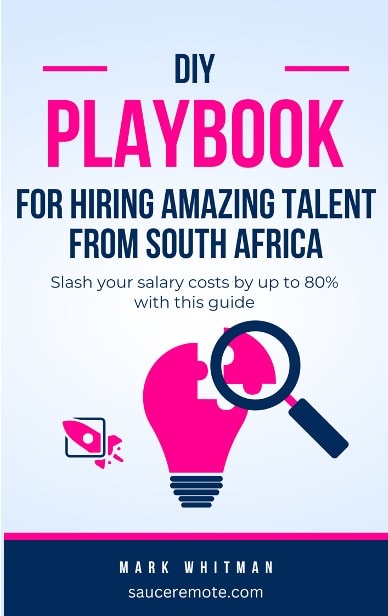Interested in adding Mexican talent to your team? Smart move!
Mexico has a thriving economy, with a GDP of $1.4 trillion, and a diverse, talented workforce of over 58 million people, making it a great place for international businesses looking to grow.
However, navigating Mexican employment laws and cultural differences can be a challenge.
That's where an Employer of Record (EOR) in Mexico can help. They offer key benefits like simplified hiring processes, compliance with local labour laws, and reduced administrative burdens.
Join me as I cover how partnering with an EOR in Mexico can be the key to seamless, compliant growth for your business.
Ready? Let’s roll.

Discover how to slash your salary costs by 80%
Get our exact process for hiring amazing overseas talent from South Africa. Includes copy-and-paste templates and a detailed salary guide.
What Is an Employer of Record in Mexico?
An Employer of Record in Mexico is a third-party organisation that legally employs workers on your behalf.
They handle all local HR, payroll, and compliance needs, so you can focus on managing the day-to-day activities of your team.
In simple terms, the EOR is the official employer of your Mexican staff, taking care of administrative and legal duties while you direct your team’s work.
My pro tip: Not quite familiar with the concept of an EOR? Check out my guide on What Does EOR Stand For for a deeper dive.
Why Do Businesses Choose an EOR in Mexico Instead of Hiring Directly?
Here are some key reasons:
- Quick Market Entry: Skip the long process of establishing a legal entity.
- Compliance Support: Navigate complex labour regulations with local experts.
- Lower Costs: Avoid the costs and administrative burden of setting up a full local entity.
With EOR services, you can easily access the skilled Mexican workforce without dealing with the usual complications, such as complex bureaucratic processes, or managing tax compliance and payroll intricacies.
But wait, what makes Mexico’s labour market so attractive, and how can a Mexican EOR make it work for you?
Let’s break it down.
Hire remote talent from South Africa & slash salary costs by 80%
Salaries start from £8,000 per year!
Understanding the Mexican Employment Environment
When I first looked into hiring in Mexico, I found the country’s labour laws and dynamic work culture different from what I was used to.
Mexican labour laws are designed to protect employees, which is fantastic, but they can be tricky for foreign companies to navigate.
Here are the basics:
Standard Working Hours and Overtime
In Mexico, the typical workweek is 48 hours, usually consisting of 8-hour days from Monday to Saturday.
Employees can work up to 48 hours per week by law.
Work beyond these hours is considered overtime, paid at double the regular rate. If employees work more than nine hours of overtime per week, the rate jumps to triple pay.
Strict compliance is important, as non-compliance with labour laws can lead to hefty fines.
For example, companies found in violation of labour standards can face fines of up to 5,000 times the daily minimum wage, along with potential legal disputes and reputational damage.
That’s a lot of money if you slip up. And on the topic of money, here’s what you need to know.
Compensation and Currency
The currency in Mexico is the Mexican Peso (MXN).
As of 2024, the general minimum wage is 241.15 MXN per day, while the Northern Border Zone has a higher rate of 375.90 MXN per day.
Compensation in Mexico typically includes:
- Bonuses: A “Christmas Bonus” (“Aguinaldo”) is required by law, with employers paying at least 15 days' wages before December 20th each year.
- Benefits: Additional perks like private health insurance and meal vouchers are often provided by employers to stay competitive.
Next, let’s discuss public holidays and vacation leave.
Hire remote talent from South Africa & slash salary costs by 80%
Salaries start from £8,000 per year!
Public Holidays and Vacation Leave
Mexico observes several national public holidays, including:
- New Year's Day (January 1)
- Constitution Day (First Monday in February)
- Benito Juárez's Birthday (Third Monday in March)
- Labor Day (May 1)
- Independence Day (September 16)
- Revolution Day (Third Monday in November)
- Christmas Day (December 25)
Vacation Leave
After one year of service, employees are entitled to six days of paid vacation. This increases by two days each year until the fourth year, and after that, it grows every five years.
Employers must also provide a vacation bonus of at least 25% of the employee's daily wages during their time off.
This bonus is mandated by law to ensure employees are adequately compensated during their rest period, which helps promote work-life balance and maintain productivity.
It also benefits employers by fostering employee satisfaction and reducing turnover.
Now, let’s talk about taxes and social security contributions.
Tax Responsibilities and Social Contributions
To stay compliant in Mexico, it’s crucial to understand the tax system:
Income Tax
Employers must withhold income tax from employee salaries. Depending on income level, income tax rates range from 1.92% to 35%.
Social Security Contributions
Employers also contribute to social security, which includes health, disability, and retirement benefits.
These contributions are typically calculated as a percentage of the employee's salary, with around 20-25% going towards various social security programs, including healthcare, pensions, and workplace risk insurance.
The employer contribution rate is roughly 20-25% of the employee’s salary, based on factors like salary level and job risk.
For more detailed information, check Mexico’s Tax Administration Service (SAT).
Hire remote talent from South Africa & slash salary costs by 80%
Salaries start from £8,000 per year!
Leave Policies and Parental Benefits
Here’s what you need to know about employee entitlements in Mexico:
Sick Leave
Employees receive paid sick leave through the Mexican Social Security Institute (IMSS), with payments based on the nature and length of the illness.
Maternity Leave
Female employees are entitled to 12 weeks of paid maternity leave—six weeks before and six weeks after birth—with options for extension under certain conditions. Payment is handled by social security.
Paternity Leave
Male employees are entitled to five days of paid paternity leave after the birth or adoption of a child.
Compared to other countries, Mexico's paternity leave is relatively short—many European countries offer up to two weeks or more.
Next, let’s discuss probation and termination periods.
Probation Period and Termination
Here’s what you should know when hiring in Mexico:
Probation Period
Probation periods are typically 30 days, but can extend to 180 days for specialised or managerial roles. During this time, employment can be terminated without significant legal consequences.
Notice and Termination
Notice periods depend on the employment contract, but Mexican labour law also mandates severance for unjustified dismissals, which can include three months’ salary plus additional compensation.
Managing these regulations can be challenging, which is why partnering with an EOR is so beneficial.
An EOR will handle tasks such as drafting compliant employment contracts, managing payroll and tax filings, ensuring adherence to labour laws, and handling employee benefits—all of which can be complex and time-consuming.
They take care of compliance so you can focus on your business.
But how do you choose the best EOR in Mexico? I can help.
Hire remote talent from South Africa & slash salary costs by 80%
Salaries start from £8,000 per year!
Choosing the Right EOR in Mexico
Picking the right employer of record in Mexico is essential for hiring effectively. Here’s what to consider:
- Knowledge of Mexican Employment Laws: Look for expertise in crafting compliant employment contracts and staying up-to-date with local regulations.
- Service Offerings: Ensure the EOR provides end-to-end services, including payroll, HR support, legal compliance, and benefits management.
- Clear Pricing: Request a transparent fee structure to avoid surprises, such as hidden administrative charges, onboarding fees, or unexpected costs related to compliance support.
- Customised Solutions: The EOR should offer flexibility for your industry, company size, and specific needs.
- Proven Experience: Check testimonials, review case studies, and verify their track record in Mexico.
- Local Expertise with a Global Network: A strong local team is key to navigating cultural nuances and providing timely support.
And what if this sounds too tricky? Well, I have another solution.
Consider Other Labour Markets and EORs
Mexico offers fantastic opportunities, but it’s also worth considering other regions, such as South Africa, Brazil, Japan, and the Philippines.
For example, South Africa has a well-educated, English-speaking workforce with only a slight time difference.
If South Africa interests you, an experienced Employer of Record in South Africa can help you establish a team there smoothly.
Hire remote talent from South Africa & slash salary costs by 80%
Salaries start from £8,000 per year!
My Final Thoughts
And there you have it: Building your team in Mexico doesn’t need to be complicated. With a reliable Employer of Record in Mexico, you can confidently navigate labour laws and cultural practices without the stress.
Focus on growing your business, and let your EOR take care of the rest.
